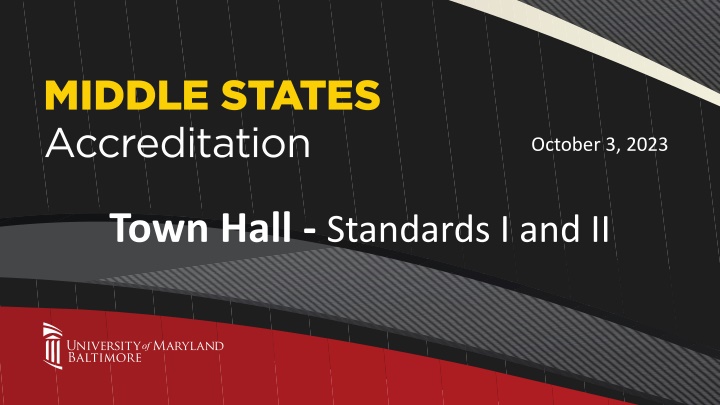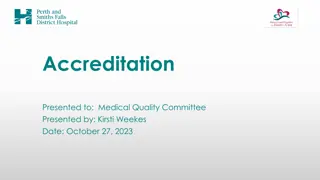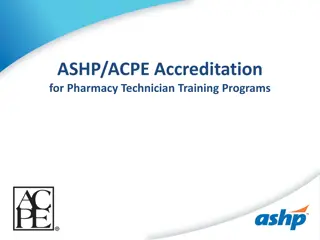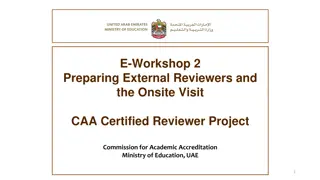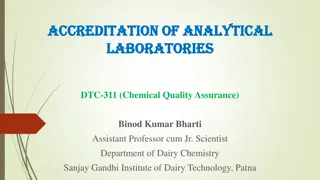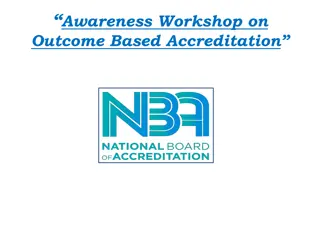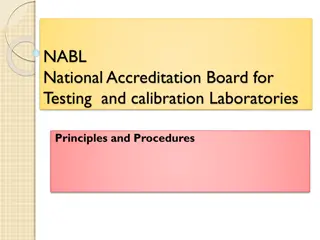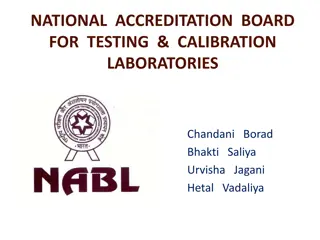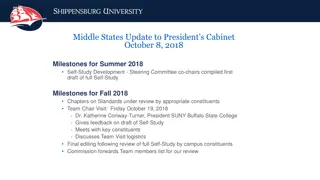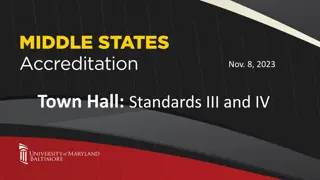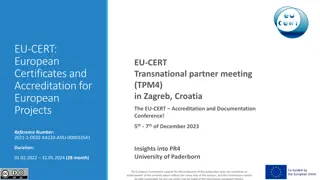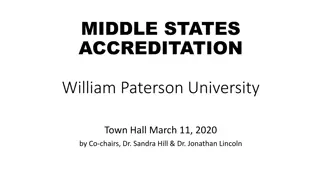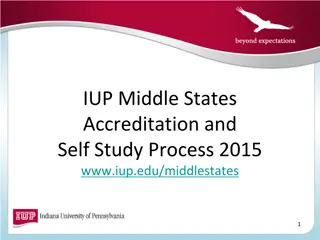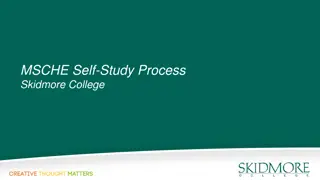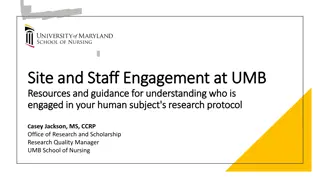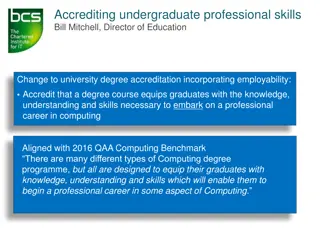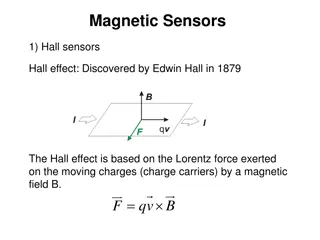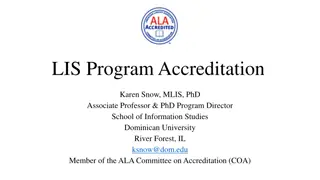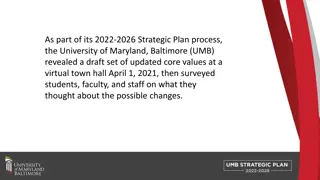UMB Town Hall on Accreditation Standards - Importance of Middle States Commission
UMB holds a Town Hall meeting discussing its active accreditation cycles and the role of Middle States Commission on Higher Education (MSCHE). The institution emphasizes the significance of compliance with MSCHE standards to maintain accreditation, crucial for federal financial aid eligibility. Losing accreditation would put all programs at risk, highlighting the importance of meeting rigorous institutional standards set by MSCHE.
Download Presentation

Please find below an Image/Link to download the presentation.
The content on the website is provided AS IS for your information and personal use only. It may not be sold, licensed, or shared on other websites without obtaining consent from the author.If you encounter any issues during the download, it is possible that the publisher has removed the file from their server.
You are allowed to download the files provided on this website for personal or commercial use, subject to the condition that they are used lawfully. All files are the property of their respective owners.
The content on the website is provided AS IS for your information and personal use only. It may not be sold, licensed, or shared on other websites without obtaining consent from the author.
E N D
Presentation Transcript
October 3, 2023 Town Hall - Standards I and II
October 3, 2023 Town Hall - Standards I and II Call to Conversation Bruce E. Jarrell, MD, FACS President Roger J. Ward, EdD, JD, MSL, MPH, Provost and Executive Vice President Mark A. Reynolds, DDS, PhD, MA, Dean, School of Dentistry Co-Chairs, Middle States Steering Committee Gregory C. Spengler, MPA Associate Vice President for Institutional Effectiveness Middle States Accreditation Liaison Officer
October 3, 2023 Town Hall - Standards I and II UMB Has a Very Active Cycle and Culture of Accreditation Each professional school has an independent accreditor. The timeline for renewal of accreditation is unique for each school. For example, the School of Nursing s accreditation cycle is 10 years, while the School of Medicine s cycle is 8 years. In some schools, separate accreditors govern at the program level. For example, the Nurse Anesthesia Program is part of the Graduate School and is accredited by a specialized accreditor different from that of the School of Nursing.
October 3, 2023 Town Hall - Standards I and II UMB Is Accredited as an Aggregate by MSCHE MSCHE stands for the Middle States Commission on Higher Education. MSCHE is recognized by the U.S. Department of Education as an institutional accreditor and has accredited over 600 institutions. Institutional accreditors do not accredit individual programs, units, or locations, they accredit institutions in their entirety. That s why schools and programs have their own separate system of accreditation.
October 3, 2023 Town Hall - Standards I and II Why Does Middle States Matter? Institutional accreditors provide a so-called seal of approval that is a prerequisite to receipt of federal financial aid funds! MSCHE mandates that its member institutions meet rigorous and comprehensive standards, which are addressed in the context of the mission of each institution and within the culture of ethical practices and institutional integrity. An institution seeking accreditation demonstrates that its goals are achieved through self-regulation and peer review. If UMB were to lose its accreditation, EVERY school and program would be at risk.
October 3, 2023 Town Hall - Standards I and II Middle States Standards and Requirements Accredited institutions are expected to demonstrate compliance with MSCHE s seven standards (and related requirements), to conduct their activities in a manner consistent with the standards and requirements, and to engage in ongoing processes of self-review and improvement. Standard I Mission and Goals Standard II Ethics and Integrity Standard III Design and Delivery of the Student Learning Experience Standard IV Support of the Student Experience Standard V Educational Effectiveness Assessment Standard VI Planning, Resources, and Institutional Improvement Standard VII Governance, Leadership, and Administration
October 3, 2023 Town Hall - Standards I and II UMB s Accreditation Components and History The accreditation process has two main parts: The creation and submission of a Self-Study report to MSCHE. A multi-day site visit and review in spring 2025 by a team composed of peer evaluators from other accredited institutions organized by MSCHE. UMB s MSCHE accreditation was reaffirmed in June 2016. UMB s accreditation status will be acted on again by MSCHE in 2025.
October 3, 2023 Town Hall - Standards I and II Intended Outcomes of the Self-Study To engage in an inclusive and transparent self-appraisal process. To produce a Self-Study report that demonstrates compliance with the seven standards and related requirements. To develop forward-looking recommendations to inform UMB s next Strategic Plan to move the institution further along its quest for excellence in graduate and professional education, research, clinical activities, and service for the public.
October 3, 2023 Town Hall - Standards I and II Self-Study Structure - Steering Committee Broad representation (24 staff, faculty, students) from across the University. Seven working groups, each with three co-chairs charged with producing a draft chapter for each standard: Showing evidence of compliance with their assigned standard and the related requirements Showing areas of possible noncompliance Identifying opportunities for improvement
October 3, 2023 Town Hall - Standards I and II Self-Study Structure - Logistics Committee Ten core staff supporting the co-chairs and Steering Committee. Prepares agendas for Steering Committee meetings Organizes town halls Serves as a liaison in support of assigned working group Plans the arrangements for the visiting team of peer evaluators
October 3, 2023 Town Hall - Standards I and II What Is Today s Objective? Divide into small groups to assist the Working Groups in their assessment of UMB s satisfaction of the relevant standard and related requirements. This town hall is an important part of UMB s self-review process. Thank you for taking the time to be engaged!
October 3, 2023 Town Hall - Standards I and II Standard I Mission and Goals Alexa A. Mayo, MLS, AHIP Bill Joyner, JD, MSW James B. Kaper, PhD Logistics Committee Liaison: Victoria Meadows, MS
October 3, 2023 Town Hall - Standards I and II Standard I Mission and Goals UMB s Mission Statement: To improve the human condition and serve the public good of Maryland and society at-large through education, research, clinical care, and service. Standard 1 focuses on the appropriateness, effectiveness, and alignment of the mission and goals of UMB and its constituent organizations such as schools and administrative units. This standard also focuses on how well the institutional mission and goals are integrated into organizational processes and activities such as budgeting and teaching.
October 3, 2023 Town Hall - Standards I and II Standard I Mission and Goals 1. How does UMB s mission statement shape its current strategic plan? 2. To what extent should UMB s mission statement be reviewed and revised to reflect post-pandemic shifts, especially as they relate to: a. How we teach our students b. How we conduct research; and c. How we strengthen equity, diversity, and inclusion 3. What can UMB do to demonstrate the economic and social impact of its community engagement initiatives in Baltimore?
October 3, 2023 Town Hall - Standards I and II Standard II Ethics and Integrity Susan Buskirk, DM, MS Geoffrey Greif, PhD, MSW, LCSW-C Vanessa Harrington, MS, SHRM-CP Logistics Committee Liaison: Courtney Resnick, EdD, MA
October 3, 2023 Town Hall - Standards I and II Standard II Ethics and Integrity Ethics and integrity are central, indispensable, and defining hallmarks of effective higher education institutions. In all activities, whether internal or external, an institution must be faithful to its mission, honor its contracts and commitments, adhere to its policies, and represent itself truthfully.
October 3, 2023 Town Hall - Standards I and II Standard II Ethics and Integrity 1. 2. 3. Where are UMB s policies relating to ethical expectations? What UMB programs promote ethical conduct? How do we know that our policies/procedures are working? What does it look like. What does it feel like? Are these policies applied equitably across groups? How can UMB s ethical practices and reporting mechanisms be improved? Why is it important for members of the UMB community to act ethically? 4. 5. 6.
October 3, 2023 Town Hall - Standards I and II Small Group Discussions 1. Questions to be answered 2. Potential evidence 3. Potential recommendations and opportunities
October 3, 2023 Town Hall - Standards I and II Input and Considerations from Your Groups
Upcoming Town Halls Join the Conversation umaryland.edu/middlestates/register/ PLANNING, RESOURCES, AND INSTITUTIONAL IMPROVEMENT / GOVERNANCE, LEADERSHIP, AND ADMINISTRATION Nov. 1, 2023 1 p.m. | SMC Campus Center | Elm Ballroom DESIGN AND DELIVERY OF THE STUDENT LEARNING EXPERIENCE / SUPPORT OF THE STUDENT EXPERIENCE Nov. 8, 2023 Noon | SMC Campus Center | Elm Ballroom EDUCATIONAL EFFECTIVENESS ASSESSMENT Nov. 13, 2023 2:30 p.m. | SMC Campus Center | Elm Ballroom ADDRESSING ALL SEVEN STANDARDS Nov. 16, 2023 11 a.m. | Virtual via Zoom
October 3, 2023 Town Hall - Standards I and II Provide Provide Feedback Feedback About Today s About Today s Meeting Meeting
